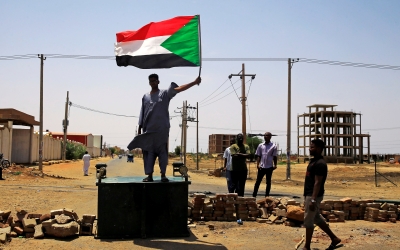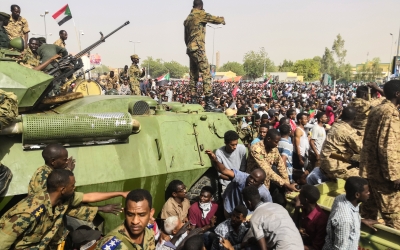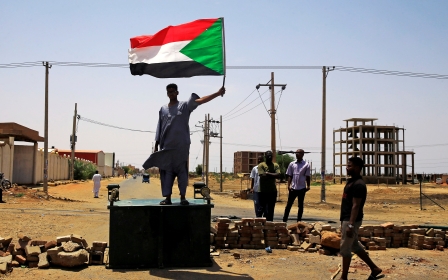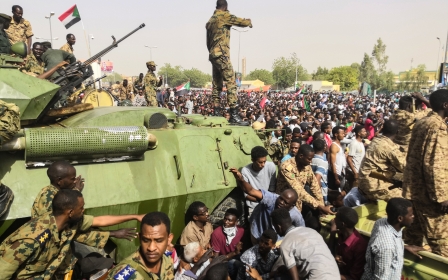Sudan's Bashir to appear in court on corruption, currency charges
Ousted Sudanese president Omar al-Bashir will stand trial on corruption and currency charges and 41 former officials from his government are under investigation, the chief prosecutor said on Saturday.
The announcement came more than two months after the military overthrew Bashir following mass nationwide protests against his 30-year iron-fisted rule.
Bashir "will appear in court next week following charges of corruption and possessing foreign currency", Alwaleed Sayyed Ahmed told reporters, without specifying the day, AFP reported.
Separately, Ahmed said the judiciary had not been consulted ahead of a decision to violently disperse a protest camp in the centre of the capital in early June, Reuters reported. Dozens of people were killed in the crackdown, which undermined talks on a transition to democracy.
New MEE newsletter: Jerusalem Dispatch
Sign up to get the latest insights and analysis on Israel-Palestine, alongside Turkey Unpacked and other MEE newsletters
Ahmed said he attended a meeting with military heads to discuss judicial supervision of a plan to clear an area known to be used by criminals adjacent to the protest camp.
He said he agreed for police to launch the operation, provided that it was carried out under the supervision of the state prosecutor's office and without using live ammunition. He said the idea of dispersing the protesters was not discussed.
A council spokesman admitted this week that military rulers had planned the camp break-up, but insisted that there had been no intention to use violence.
On Thursday, an unidentified official quoted by the SUNA news agency said Bashir was facing charges including "possessing foreign funds, acquiring suspected and illegal wealth, and ordering” the state of emergency.
In April, Sudan's army ruler General Abdel Fattah al-Burhan said more than $113m worth of cash in three currencies had been seized from Bashir's residence.
When he imposed the state of emergency, Bashir issued a decree making it illegal to possess more than $5,000 in foreign currency.
Bashir, who was toppled on 11 April following months of protests and is currently being held in the capital's Kober prison, swept to power in a coup in 1989.
Sudan suffered high rates of corruption during his rule, ranking 172 out of 180 countries in Transparency International's 2018 Corruption Perceptions Index.
Last month, Ahmed ordered Bashir questioned over money-laundering and "financing terrorism".
In an effort to quell protests that erupted against his rule in December, Bashir imposed a nationwide state of emergency on 22 February.
In May, the prosecutor general said Bashir had been charged with the killings of protesters during the anti-government demonstrations.
Protests against Bashir's rule initially erupted on 19 December after his government tripled the price of bread.
He was ousted by the army after thousands of demonstrators launched a sit-in outside the military headquarters in central Khartoum from 6 April.
But army generals have resisted protesters' demands to hand power to a civilian administration.
The protesters kept up their sit-in even as protest leaders held several rounds of talks with the generals on installing civilian rule.
But talks broke down in May over who would lead a new overall governing body - a civilian or soldier.
And on 3 June, armed men in military fatigues launched a crackdown on demonstrators camped outside the army complex that left dozens of people dead and hundreds wounded.
Protesters and witnesses accuse a feared paramilitary group, the Rapid Support Forces (RSF), of carrying out the assault on demonstrators.
General Shamseddine Kabbashi, spokesman of the ruling military council, has said the findings of a probe into the deaths would be released on Saturday.
RSF commander General Mohamed Hamdan Dagalo defended his force at a rally on Saturday in a village on the outskirts of Khartoum.
"Our image as Rapid Support Forces has been distorted," said Dagalo, who is also the deputy chief of the ruling military council.
"But we will not talk about it (the 3 June crackdown) until the findings of the report come out," he said as a crowd of supporters cheered.
Middle East Eye delivers independent and unrivalled coverage and analysis of the Middle East, North Africa and beyond. To learn more about republishing this content and the associated fees, please fill out this form. More about MEE can be found here.






